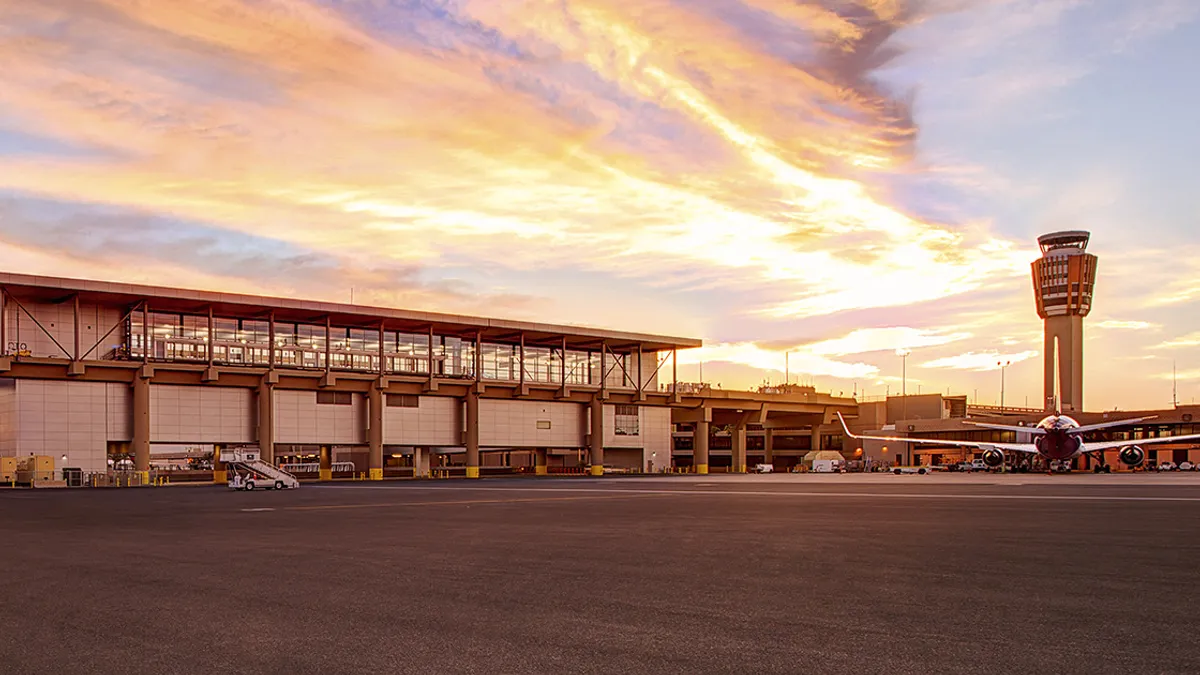Dive Brief:
- Uber and Lyft plan to cease operations at Phoenix Sky Harbor Airport (PHX) due to a new spike in ride-hailing fees, representatives for the companies told Smart Cities Dive.
- The Phoenix City Council passed a city code amendment to increase and add new fees to airport ground transportation trips. Ride-hailing fees currently are $2.66 per pick-up and will rise to $4 next year, then they incrementally increase to $5.00 by 2024. A $4 drop-off fee has also been created. However, taxi, shuttle and charter bus fees all will be lower than their current rates.
- Uber and Lyft both intend to cease operations at PHX before the fees take effect on Feb. 1, 2020.
Dive Insight:
Council documents indicate the fees will cover ground transportation infrastructure, improvements and maintenance. Fees also will fund the PHX Sky Train, a free, electric people mover that is being constructed in phases to connect the airport terminals with parking, a Valley Metro Rail station and rental car facilities.
Funneling fees into the Sky Train is an element of the amendment that Uber doesn't like. The ride-hailing fees will cover 80% of the Sky Train's operations and maintenance costs, yet ride-hailing customers will not benefit from this amenity, an Uber spokesperson told Smart Cities Dive in an email.
Uber sent a letter to city leaders in advance of the council vote asking for further discussions about alternatives to the new fees. It also stated the company's intent to stop operating at PHX if the measure passed.
Both of the major ride-hailing companies say the additional fees would negatively impact riders and drivers.
"We are not opposed to paying our fair share of ground transportation, however the new fees unfairly burden [ride-hailing] customers," the Uber spokesperson said.
Lyft offered a similar statement following Wednesday's amendment passage. "We are disappointed in the outcome of today’s City Council vote," a spokesperson told Smart Cities Dive in an email. "Despite our best attempts to negotiate a more equitable solution Airport leadership has been opposed to reason... [Our drivers and riders] should not have to shoulder the burden of the city's budget shortcomings."
Airports have become a challenging operating environment for ride-hailing companies recently. In one major instance, Los Angeles International Airport (LAX) banned curbside ride-hailing pick-ups and customers now have to take a shuttle to a ride-hailing pick-up zone. LAX believes the change could reduce central terminal congestion by up to 15%.
Uber previously pulled its service from one other airport: Ontario, CA, about 55 miles from Los Angeles. Service there ended in late summer after an unsuccessful attempt at discussions over a ride-hailing fee hike.
To alleviate some congestion and pick-up issues, Lyft and Uber both rolled out pin-number programs at several U.S. airports, through which rides receive a pin number at booking and then wait in a line for an available driver.
Airport fees are just one of the ways city leaders are cracking down on ride-hailing services. Last month, Chicago approved a ride-hailing congestion tax. Taxes on single-person trips will rise from 72 cents to $1.25 per trip, and traveling into downtown will incur an additional fee — $1.75 for solo riders and 60 cents for shared rides. Washington, DC increased ride-hailing service taxes 5% last year. And Seattle recently passed a measure requiring a ride-hailing driver minimum wage and compensation for benefits and expenses.












